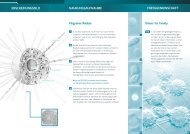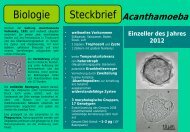Paramecium - Deutsche Gesellschaft für Protozoologie / German ...
Paramecium - Deutsche Gesellschaft für Protozoologie / German ...
Paramecium - Deutsche Gesellschaft für Protozoologie / German ...
You also want an ePaper? Increase the reach of your titles
YUMPU automatically turns print PDFs into web optimized ePapers that Google loves.
Amoebae in carbonate precipitating microenvironments of<br />
karst caves<br />
Janez Mulec 1 , Julia Walochnik 2<br />
1<br />
Karst Research Institute, Scientific Research Center of the Slovenian Academy<br />
of Sciences and Arts, Postojna, Slovenia<br />
2<br />
Department for Medical Parasitology, Clinical Institute of Hygiene, Medical<br />
University of Vienna, Austria<br />
In karst caves microorganisms are involved in rock-building and<br />
rock-weathering processes. The aim of the current study was to reveal<br />
and to compare the occurrence of free-living amoebae in these habitats.<br />
Altogether, 11 samples from 4 Slovenian karst caves and 9 different<br />
habitats were investigated for amoebae by the plate culture method.<br />
Isolated amoebae were identified by their morphologic characters and<br />
genotyped by DNA sequencing.<br />
Five samples were positive for amoebae, including Acanthamoeba<br />
castellanii genotype T4, Echinamoeba silvestris, Hartmannella vermiformis,<br />
and a vahlkampfiid amoeba. The abundance of acanthamoebae<br />
and hartmannellae in caves is interesting not only because<br />
the former are potential pathogens, but also because both can serve as<br />
vehicles for many different bacteria and may thus play a significant<br />
role for the perpetuation of the microfauna in caves. From stromatolitic<br />
stalagmites, a typical biogenic speleothem, a vahlkampfiid amoeba<br />
was isolated that might represent a new species, or even genus in<br />
the vicinity of Neovahlkampfia. The amoeba cannot grow at temperatures<br />
>30°C, has prominent uroid filaments, but does not transform<br />
to a flagellate in the enflagellation test.<br />
janez.mulec@guest.arnes.si<br />
julia.walochnik@meduniwien.ac.at<br />
42





